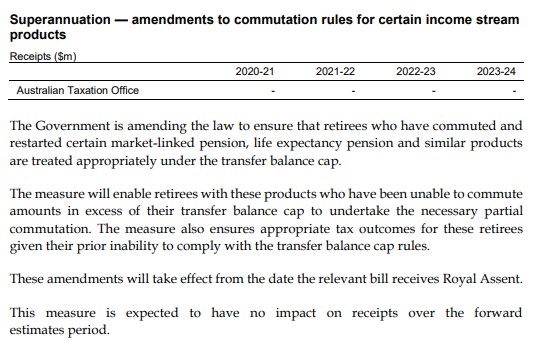As part of the Government’s Mid Year Economic & Fiscal Outlook (MYEFO) released in December 2020, we have seen a proposed measure announced to amend the law to enable market linked pensions and defined benefit pensions to undertake a partial commutation of amounts in excess of the member’s transfer balance cap.
 https://budget.gov.au/2020-21/content/myefo/download/myefo-2020-21.pdf (refer to page 138 of Budget papers).
https://budget.gov.au/2020-21/content/myefo/download/myefo-2020-21.pdf (refer to page 138 of Budget papers).
Legacy pensions
With a number of SMSF legacy pensions being treated as capped defined benefit income streams (CDBIS) at 1 July 2017, it meant that for transfer balance cap (TBC) purposes the special value calculation was significantly higher than the member’s actual account balance.
This hasn’t necessarily posed a concern for account balances above the TBC, as the assets supporting the income stream remained earnings tax exempt due to the non-commutable nature of the pension. The defined benefit income cap then applies which generally taxes any pension payments above $100,000.
Commutation options
It is not uncommon since 1 July 2017 for members of these legacy pensions to look want to commute the pension and re-purchase a market linked pension (MLP). Any commutation and re-purchase after 1 July 2017 does mean that the income stream is no longer a CDBIS for transfer balance cap purposes.
We have seen examples where the commutation of the CDBIS and the purchase of the MLP has meant that the member’s transfer balance account is below the $1.6 million cap – simply by the pension being assessed for TBC purposes on the new purchase price, rather than its original special value reported amount.
However, if a member has a larger amount supporting the income stream that is commuted, the law does not currently provide an answer as to how the repurchased MLP with an excess transfer balance amount will be dealt with?
To understand this further, let’s contemplate the following example:
Example
Bill (82) is receiving a lifetime complying pension from within his SMSF. The assets supporting this income stream (including reserves) are $3.5 million. He wishes to cease the complying pension by commuting it and purchasing a Market Linked Pension, which will ensure that in the event of his death the benefit can be paid directly to one of more of his nominated beneficiaries.
Where Bill arranges to restructure the income stream within his SMSF, there will be a commutation debit for his former pension, then a credit for the MLP. This will create an excess transfer balance of $1.9 million (being $3.5m less $1.6m).
Whilst Bill ordinarily cannot commute the excess as the MLP as it is a non-commutable income stream, the MYEFO measure suggests that a partial commutation may be able to occur in the future.
Any current excessive amount above the transfer balance cap will have notional earnings being applied, but it is unknown how such an amount is treated in this scenario.
More questions than answers?
At this time, the proposed measure remains light on details.
Once draft legislation has been issued, we will gain a great understanding of a number of potential issues including how the commutation of a non-commutable income stream will actually apply to meet the transfer balance cap requirements? For example, will the amount be allowed to be rolled back into the member’s accumulation interest, or alternatively will it be required to be commuted and cashed out of the super system?
Once this legislation is finalised, there are going to be a number of important considerations for these legacy SMSF pensions that are looking to commute and repurchase as market linked pensions – whether they be larger balance income stream or even smaller balances where Centrelink considerations will come into play for pre 1 January 2015 income streams (grandfathered).
Did you know?
Smarter SMSF has documentation available for the commutation and purchase of market-linked pensions and a range of other legacy pensions that continue to be paid from self-managed super funds.
You can enquire about these documents by emailing team@smartersmsf.com for more details about access to these documents.








